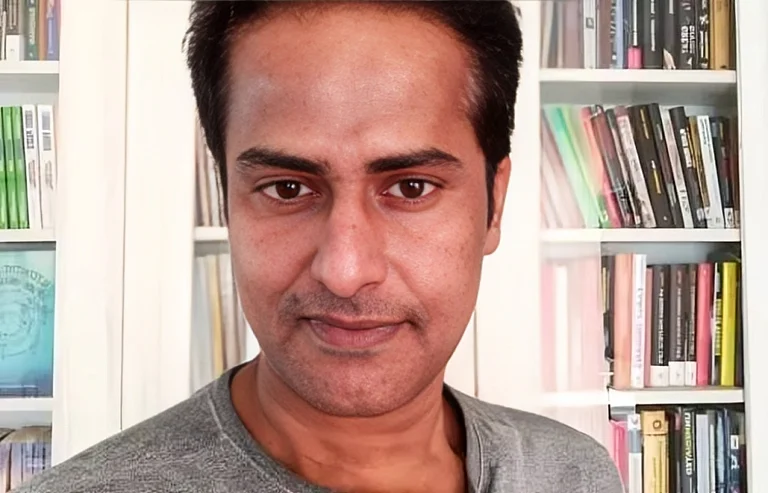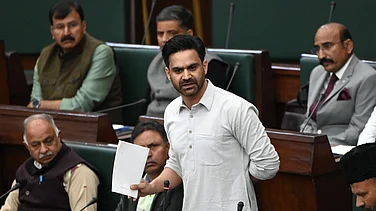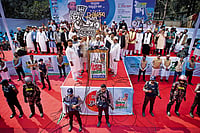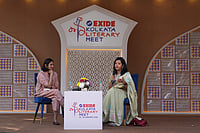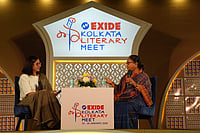“We are free! We are free!” Ramchandra Chamar entered the newsroom with a bang. He was ecstatic. He threw his notebook and pen up in the air—the way a cricket fielder does while celebrating a successful catch—and ran straight towards the editor’s room, shouting at the top of his voice, “We are freeeeeeeeeee!”
Every other person in the newsroom of Democracy24x7 was up, their eyes curious; their faces glowing with broad smiles. Some editors were taking notes from a series of emails and HappyChat messages—the government’s priorities for the day for the major bulletins and the digital editions. Another set of editors were, with equally rapt attention, listing the priorities of the owner. Those that appeared on both lists would be of the greatest importance. Journalists would have to be assigned accordingly. They all got distracted.
The government had just HappyChatted a message saying a major Mesopotamian agent had been identified. He was active under the garb of a poet and novelist. He may also have had connections with the Incas. The newsroom was expecting this to be the major news of the day and two journalists had been assigned to get the details of the so-called poet’s treachery. Exposing such people had been a national duty and such events served as the source of adrenaline rush that journalists often required.
Now, Chamar had brought good news for sure, there had not been any bad news in recent times in any case, but what good news was it? Or how big? Curious journalists herded in front of the editor’s room. The people of the nation were already free. What new freedom had he, or all, got?
The last time Chamar had come running like this was when the government had changed the designation of ‘minister’ to harshavardhana. Minister, according to Merriam-Webster, also meant “a clergyman or clergywoman especially of a Protestant communion”. But harshavardhana was free from colonial influence and reflected joy and happiness. The move made the whole country so happy that it ranked first in a global happiness index painstakingly prepared and released by the government a few months later.
Inside the editor’s chamber, Chamar, standing in front of the editor’s desk, took a few moments and deep breaths to compose himself, while the editor waited impatiently, wearing a pleasant smile. “Caste conflict is over!” Chamar broke the news, still excited, “the government has removed all references to the so-called class exploitation and caste conflicts from the syllabus. The education harshavardhana said caste is now a thing of the past. We have been freed from the burden of history!”
Now, that was big news, indeed! Though there were not many people in the newsroom from Chamar’s caste—who used to be considered untouchables since the Muslim and Christian invasions of the country—everybody felt happy for him and for the whole country that the very history of caste had been thrown away. “Jai ho!” they shouted in chorus.
Since the caste problem was now gone, caste-based reservations in jobs, education and political representation should cease as well, they all thought, hoping to see an end to the discriminatory system called reservation created by colonialists. The editor asked what else the education harshavardhana had said. Chamar said he could not note down everything out of excitement, and what he recorded on his phone may not be clearly audible because all journalists were busy cheering the announcement. The audio must have a lot of noise. But he remembered that the harshavardhana said, “It is the beginning of a new life, a new people’s history, and a new future.”
Everyone in the newsroom clapped. Those who got overexcited drummed on the desk with their hands. The editor called for a meeting with other editors to decide on the design and contents for the front page.
Chamar was back in the newsroom. He now had to tell the whole story before the camera for HappyRajya and other social media platforms. Spreading happiness and positivity is the primary duty of journalists, he once heard the supreme leader say, and had strongly believed in it since then. The gatekeeper who had collected his pen and notebook from the floor had handed them over to him. But he was still too excited to have a look at his notes. He started explaining things to Aulad, the colleague interviewing him, straight from his memory.
Aulad was not his original name. It was Shahjahan Khan. But one day, during a friendly discussion with journalists, a harshavardhana jokingly called him Shahjahan ka aulad and everybody burst out in such stormy laughter that his new name spread like wildfire. He became known as Shahjahan ka aulad to one and all. With time, the way Benjamim becomes Ben, Stephen becomes Steve and Ashwin becomes Ash, Shajahan ka aulad became simply Aulad. Everybody called him Aulad.
When the guides invited him for a discussion and he was subsequently sanitised for three months, he saw the guides write in their diary, Shahjahan Khan alias Aulad. Getting a new name was an amazing thing. Like a new identity! A new life!
There is no reason to think he resented the invitation from the guides. It was more than a year ago that the ethical nourishment harshavardhana had clarified that since the colonial powers had been thrown out, colonial terms—like police, arrest, interrogation and jail that provoked resentment—were no longer necessary. The police were renamed as guides. They would ‘invite’ and ‘discuss’, and if found necessary, would make arrangements for a period of ‘sanitisation’, colloquially called sanit-term.
Similarly, during an interaction with editors, the media harshavardhana advised changing colonial terms like ‘victim’ to ‘martyr’. Victims spread grief, but martyrs instilled a sacrificial mindset, the harshavardhana had argued. And the editors agreed.
Aulad knew and remembered it all, but it was still his own mistake that led to him to be invited. He had been well-praised when, in the aftermath of a bridge collapse that gave the country a dozen martyrs, he explained in a report from the spot that the good thing about the bridge collapse was that the administration now knew the bridge was dangerous, the fall was necessary to open their eyes, and also of the people, and that from now on the government helpers can divert traffic to other bridges. What’s more, the people will avoid it themselves. The report earned millions of views and, of course, revenue.
But he forgot that the rule of spreading happiness did not apply to occasions of national shock. So, when he tried to spread positivity by explaining the situation similarly in the aftermath of another bridge collapse in which a harshavardhana was among the martyrs, it was held as a breach of national sentiment. Deaths of harshavardhanas were moments of national shock. The guides had no other way but to invite him. He came out happy and pleased after the sanitisation.
He was all the more happy because just after coming out, he got to know that the government had, in the meanwhile, erased Shahjahan the king from the school and college textbooks. To celebrate this, he too dropped Shahjahan from his life and formally changed his name to Aulad Khan. A fresh life with a fresh history.
In the newsroom, among the visibly-happy lot—including a happy Aulad interviewing a highly-satisfied Chamar—there was one tense person, Tamina. Over a month ago, she heard from her niece that the book on the caste system that she had borrowed from the college library had been asked to be urgently returned. Tamina had a hunch there was an indication of something bigger in it.
Gradually, she noticed that books on the caste system were vanishing from the racks of prominent bookstores. In one of them that she frequently visited, she spotted three books on caste and decided to buy them before they, too, vanished. But the shopkeeper, Savitri, was evidently fond of her, as she advised Tamina not to buy those.
She secretly told Tamina that it was the government that had collected all these books over the last few weeks from different stores. Since they left some books at the stores, it was quite certain that the guides would keep an eye on the people buying the remaining ones.
Savitri had even taken the trouble and risk to copy important passages from those books, by hand, avoiding her own CCTV camera that she knew was also connected to the watchers’ system. She could not have typed those out. Who knows whose computer was under the government’s supervision? She then secretly handed over those notes to Tamina during one of her visits to the shop.
Tamina kept all these notes at home. Was there any chance the guides or watchers knew of these notes? She had in the past written about the caste system a few times; not unhappy things, of course! Still, her interest in the caste system was evident from her past writings. Interest itself is a dangerous thing.
She remembered that around this time last year, the government had announced that the Aryans were born in this very land and therefore, the colonial version of history that the Aryans migrated from the Central Asian Steppes to different parts of the world was being removed from the textbooks. The announcement made the subject irrelevant.
The government had introduced an annual event in which the people were encouraged to donate the books that they no longer needed to the government’s collection. Tamina, too, gave away books every year. A mix and match, as she knew the guides and watchers analysed the books being given away. But she did not give away her copy of Nihar Ranjan Roy’s Bangalir Itihas, which speaks of Aryan migration, first into the northwestern part of a country and then towards its eastern, riverine delta, at a later date.
She remembered how, during a friendly visit to her house, a guide had exclaimed on spotting the book, “Oh! So, you still need that book!”
Now that the government had made caste a thing of the past, would the guides and watchers not have an eye on those who had taken interest in it in the past? Handwritten notes meant extra importance. Why would one copy instead of buying the book? Does copying not deprive the writers and publishers? Why take the trouble of copying by hand, if not for secrecy? Why secrecy, if not against greater societal interest? Why secrecy, if not anti-national, if not Urban Chinese?
Why would someone want to keep bad memories alive, if not an unhappy and unsatisfied soul worthy only of a pitiable life in an electric white sanatorium?
Tamina must find a way not to destroy the copied passages and without getting caught. But before that, she desperately needed to break a happy news. She needed to keep looking energised. She went to the canteen for a cup of milk.
(This appeared in the print as 'Inside Democracy 24x7')







